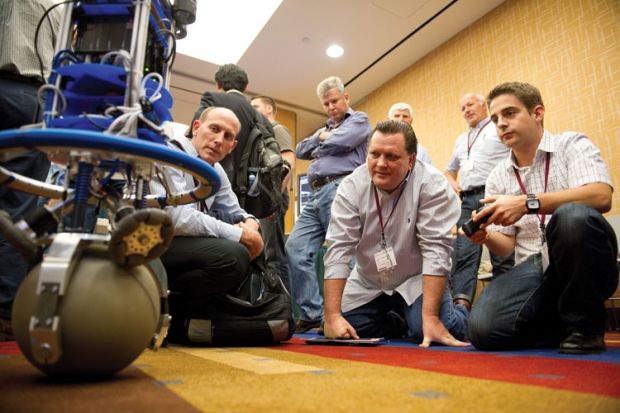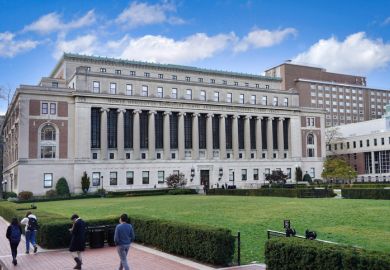Source: Getty
Promoting links: the evolution of Knowledge Transfer Partnerships led to greater collaboration between businesses and universities
Next month, one of Britain’s most prominent commentators on higher education will step down and pursue other interests.
Although he describes himself as “basically what the Americans call a ‘policy analyst’”, Roger Brown has been a senior civil servant, the one and only chief executive of the Committee of Directors of Polytechnics, the head of the predecessor to the Quality Assurance Agency, the vice-chancellor of Southampton Solent University – and, since 2007, professor of higher education policy at Liverpool Hope University.
When his contract comes to an end in November, he leaves the sector satisfied that he has “explored in great depth” all the central issues in British higher education – “how the thing should be funded, how quality should be assured, how we should tackle widening participation” – and set out his detailed answers in books and articles.
But Brown also leaves higher education feeling “pretty pessimistic” about the sector, essentially because the goal of “accommodating a larger student population within perceived expenditure limits and without loss of quality” cannot be achieved “without an increased level of public expenditure and an increased level of attention to quality. Neither of these have we really had.”
He now has “virtually no contact with David Willetts”, the universities and science minister, although they did meet to discuss quality assurance while the minister was in opposition, and “little contact with civil servants, partly because I’m not sure they have much influence on what happens anyway”.
Brown adds that he “used to be on very good terms with the main civil servant [responsible for higher education], but I’m not sure I could now tell you who that person is”. While obviously disappointed that his ideas have not proved more influential, he emphasises that he has now “literally lost interest” in “other people’s answers” and so it is time to move on.
Brown’s first significant involvement in higher education came when he was working at the Department of Trade and Industry under Lord Young of Graffham, who wanted to be secretary of state for education after the 1987 general election. When he failed to get the job, he launched a pre-emptive raid on educational territory.
This led to a £20 million project to promote links between businesses and universities – incorporating the earlier Teaching Companies Scheme, whereby the government overcame what Brown sees as a market failure by “subsidising employers to take on young graduates in a technical area such as engineering while being supervised by a local university”.
Summoning the black arts
Brown says the next secretary of state in the department, Nicholas Ridley, “was very much against this kind of scheme, so he and I had stand-up rows about it. But I managed to use the black arts of the civil servant to keep the full detail from him – and, as a result, the scheme [now called Knowledge Transfer Partnerships] is alive to this day.”
He also had a ringside seat for many of the dramas of the Thatcher years. He recalls being able to squash one of her “wild ideas”, the proposed relocation of the British Library to County Hall, vacant after the abolition of the Greater London Council. However, he was impressed by her treatment of a colleague who was “called across to No 10 to tell her what the DTI was doing about the British Steel strike. When [my colleague] told her, she got more and more upset and eventually he said to her: ‘Prime Minister, are there any facts which would enable you to take a different view of the situation?’
“She went bananas at that point and he walked back across St James’s Park thinking his P45 would be on his desk, but he didn’t hear any more and a few months later was called across for an interview to work at No 10. Apparently, Mrs Thatcher had said: ‘Who was that young man at the DTI who argued with me that time?’”
Equally impressive but less sympathetic was the Thatcher who took only a few days’ holiday each summer, so “mid-August was a time of great activity in Whitehall, as Mrs T made hay while the secretaries of state were still away”. When she was persuaded in 1988 to set up the employer-led Training and Enterprise Councils, they became the responsibility of Norman Fowler at the Department of Employment rather than a “bloody furious” Lord Young at the DTI solely on the basis of who had returned from holiday first.
Brown’s time in the Civil Service ended around the same time as Thatcher left office in 1990 and it was then that his career veered towards higher education. However, he admits that his reputation as an outspoken “individualist or maverick” has not always helped.
He was running the Higher Education Quality Council, for example, at a time when overseas partnerships were relatively new and “we were getting a lot of complaints about what was happening in some countries, so we sent out a fact-finding team and formed the view that we needed to audit these partnerships.
“The vice-chancellors were up in arms about this and I effectively outmanoeuvred them by going to some of my Whitehall contacts and getting them to write me letters saying it would be a good idea to audit these overseas partnerships. I had to do that because it was what we felt, as the quality agency, needed to be done.”
When the Quality Assurance Agency replaced the HEQC in 1997, therefore, Brown says he was “effectively blackballed, because I’d made too much of a nuisance of myself, because I was regarded as too powerful and knew the tricks that the department played”.
Heads below the parapet
Although he acknowledges that vice-chancellors operate within tight constraints, Brown regrets that almost all of them keep their heads down and refuse to speak out about major local or national issues in the way that, for example, some of their US counterparts argue strongly for gun control.
This is, of course, an easy criticism for an outsider to make. Brown himself took over as principal of what was then the Southampton Institute of Higher Education in 1998, after it had “imploded under its previous director”, and played a key role in turning it round and securing the university title of Southampton Solent in 2005. So – given his own criticism of vice-chancellors – how outspoken had Brown felt able to be while in post?
In response, he points to a run-in about “working with business in Southampton” that he had with Bill Rammell, then higher education minister. “I had to point out a few basic facts of life – that it was very hard to build relationships with organisations [such as the airport and the port] which were changing hands every five minutes.”
More generally, Brown recalls, “at Southampton, we were always fiddling with our course portfolio. In the older universities, some courses have remained unchanged for 25 years – that’s the difference between being in a market and not being in a market. So I don’t need any lectures from ministers about markets and competition and how you angle your product.”
Register to continue
Why register?
- Registration is free and only takes a moment
- Once registered, you can read 3 articles a month
- Sign up for our newsletter
Subscribe
Or subscribe for unlimited access to:
- Unlimited access to news, views, insights & reviews
- Digital editions
- Digital access to THE’s university and college rankings analysis
Already registered or a current subscriber? Login




